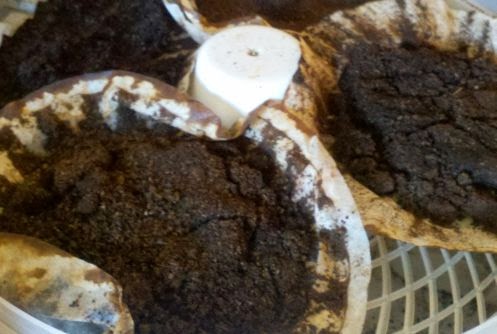Is It Safe to Get Rid of Coffee Grounds Down the Sink? - Understanding the Facts
Is It Safe to Get Rid of Coffee Grounds Down the Sink? - Understanding the Facts
Blog Article
The article author is making several great pointers regarding Should You Put Coffee Grounds Down the Sink? as a whole in the content further down.

If you're an avid coffee enthusiast, you could be wondering about the most effective way to dispose of your coffee grounds. While it might appear practical to wash them down the sink, this technique can lead to several problems for both your plumbing and the environment. In this article, we'll discover whether it's secure to place coffee grounds down the sink and review alternative disposal approaches to consider.
Alternatives to Disposing of Coffee Grounds
Trash Disposal
If you don't have a composting arrangement, an additional choice is to merely throw your coffee premises in the garbage. Be sure to seal them in a compostable bag or container to stop smells and leak. While this technique does not supply the very same ecological benefits as composting, it's a safe and hassle-free method to throw away coffee premises.
Composting
One eco-friendly choice for dealing with coffee grounds is to compost them. Coffee premises are rich in nitrogen, making them an exceptional addition to compost piles or containers. As they disintegrate, they add nutrients to the soil, boosting its fertility and texture.
Risks of Putting Coffee Grounds Down the Sink
Plumbing Issues
Among the main worry about disposing of coffee grounds down the sink is the danger of obstructing your pipes. Coffee premises do not liquify in water and can accumulate with time, developing a dense sludge that can obstruct drains pipes and bring about pricey plumbing repairs.
Environmental Impact
Beyond the prospective damage to your plumbing, placing coffee premises down the sink can additionally harm the setting. When cleaned into the sewer system, coffee grounds can add to blockages in sewer lines and treatment facilities. In addition, the high concentration of organic matter in coffee grounds can diminish oxygen degrees in rivers, adversely affecting marine life.
Tips for Proper Disposal
Routine Maintenance
No matter just how you choose to get rid of your coffee premises, it's necessary to keep your plumbing routinely. Set up routine drainpipe cleansings to get rid of any accumulation and make certain that your pipelines continue to be clear and free-flowing.
Make Use Of a Sink Strainer
To stop coffee grounds from entering your sink's drainpipe in the first place, think about using a sink strainer. These affordable tools catch strong particles, including coffee grounds, preventing them from triggering clogs.
Verdict
While it might be alluring to clean coffee premises down the sink for comfort, doing so can have significant repercussions for your plumbing and the atmosphere. Rather, take into consideration composting your coffee premises or disposing of them in the garbage. By embracing responsible disposal practices, you can enjoy your coffee guilt-free while minimizing your ecological footprint.
Coffee Grounds Down The Drain: Are They OK?
Can Coffee Grounds Go Down the Sink?
You may be thinking, “But I pour them down the sink drain every day and I’ve never had a clogged drain!” You see, coffee grounds come from coffee beans, which are virtually rock hard by the time they’re ground and brewed. You certainly wouldn’t want to grind up the pit from a peach, apricot, or nectarine that is about just as hard because they wouldn’t break down like other foods, and it’s the same with coffee beans!
If you usually grind coffee beans in the garbage disposal because it seems the cleanest and convenient, we don’t fault you for that. And anyone who has ever had to clean up the trash with spilled coffee grounds after a dog got into it would understand the rationale. Unfortunately, coffee grounds do not break down in water, so instead of grinding up and washing away as normal foods do in a garbage disposal, they clump together and as time goes by, the grounds can form a clump and pack the drain until it develops a clog.
What to Do With Coffee Grounds
So, what do you do with coffee grounds if you can't put them down the drain? You could of course just throw them in the garbage, but we encourage you to give these practical uses for them a try!
Since coffee grounds contain key minerals for plant growth, you can use them to fertilize your garden. Coffee grounds not only fertilize gardens because they are mineral-rich, but they are also great at absorbing contaminants in the soil, particularly heavy metals. Coffee grounds are said to attract worms, which help gardens flourish. You can use coffee grounds as fertilizer by sprinkling them around your plants. You can compost your coffee grounds and use them at a later time. Coffee grounds are great insect repellents when you place them in bowls or sprinkle them around the areas you want to repel insects. To remove fleas from your dog or cat, simply shampoo your pet then rub coffee grounds throughout their fur. Rinse them off and dry as usual. Like baking soda, used coffee grounds can eliminate odors. You can place them in a bowl in the fridge and let them do the work! Mix coffee grounds with coconut oil for a wonderful face or body scrub, or to reduce the appearance of cellulite. https://www.wintershomeservices.com/blog/2019/august/coffee-grounds-down-the-drain-are-they-ok-/

Do you really like more info about What are the consequences of putting coffee grounds? Post feedback below. We would be delighted to know your responses about this article. We hope that you visit us again in the future. I beg you take a moment to promote this blog entry if you liked it. We enjoy reading our article about Can You Put Coffee Grounds in the Sink Garbage Disposal?.
Call Today Report this page